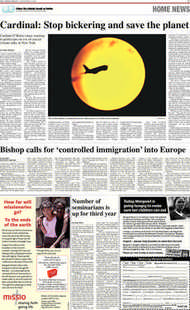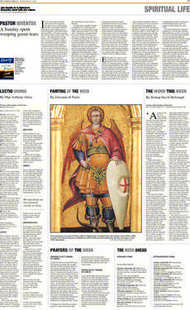Page 16, 25th September 2009
Page 16

Report an error
Noticed an error on this page?If you've noticed an error in this article please click here to report it.
Tags
Share
Related articles
French Lessons From An English Master
Dead White Males (and Beautiful White Women)
Political Cool Of A Seasoned Campaigner
Oh! What A Horrible War
Looking At Known Facts In A New Way — How Catholic...
Kissinger: the year he held the US together
Kissinger’s Year: 1973
BY ALISTAIR HORNE WEIDENFELD & NICOLSON, £20
Alistair Horne, the distinguished British historian of modern France with more than 20 books to his credit, was offered a few years ago what seemed “a thrilling opportunity”: continuing access to Henry Kissinger so that he could produce an authoritative account of Kissinger’s turbulent years in office during the Nixon administration.
It was a considerable opportunity and he was apparently an excellent choice. For Sir Alastair, born in 1925, was sent to live in the States during World War Two where he was schooled and made a lifelong friend of the irascible Right-winger William F Buckley, who died last year.
As a result of its lessons for the Iraq War, his book A Savage War of Peace: Algeria 1954-1962 caught the attention of American military brass. The same book was recommended by President George W Bush to former US Secretary of State Kissinger – a man who has never lost the guttural German accent which he brought with him to the States when he moved there as a Jewish refugee from the Nazis in 1938.
But the author might have thought more about charting Kissinger’s progress through the epicentre of Nixon’s storm before agreeing to the idea. For Kissinger’s version of events has been told again and again, including at the briefings and news conferences at the time he was in government. Then there are his subject’s own books. One of the few things everyone agrees on Kissinger is that he is a prodigious memoirist. He has already filled three volumes, totaling 3,600 pages, with his ruminations on his Nixon years and afterwards added a couple of other books on diplomacy and on Vietnam. His archives weigh in at more than 30 tons.
It is debatable, then, whether another book was needed reporting Kissinger’s long-expressed views that the Watergate break-in undermined his carefully constructed foreign policy; that Chinese Premier Zhou Enlai was among the most impressive men he ever met; or that he held things together in Washington as the Nixon administration began to unravel.
Undeterred, Horne decided to narrow his task by examining Kissinger’s activities in a single “crucial” year: 1973. Since he wanted to examine Kissinger’s foreign policy against the backdrop of a weakening presidency, his choice of year serves this purpose.
He then plunged forward. Over a period of more than three years he had many hours of prolonged meetings with his subject in Washington, New York, London and Paris. Beyond the interviews, his account relies heavily on Kissinger’s memoirs and on interviews with former aides – all of them interviewed many times before.
The year 1973 was indeed pivotal: defeat in Vietnam; Watergate, calling by year’s end for presidential impeachment and a collapsing economy, the result of the Arab oil embargo. But while there may be nothing startlingly new by way of information or insight here, one suspects that when it comes to his own story, Kissinger himself is holding the reins.
Always acutely sensitive to criticism, he miscalculated by providing Walter Isaacson full access for a 1992 biography, which was supposed to counterbalance Seymour Hersh’s withering 1983 account, The Price of Power. It didn’t. Then came Christo pher Hitchens’s The Trial of Henry Kissinger in 2001.
Choosing two British historians with conservative pedigrees must have seemed the prudent way to restore order. Horne explains that in 2004 he met Kissinger, whom he has known for almost three decades, and proposed confining himself to 1973, thereby allowing the equally prolific Niall Ferguson to work unmolested on a forthcoming official life.
Despite his ties to Kissinger, however, Horne has not given us a whitewash. He expresses perplexity at what he calls a “certain, extraordinary insecurity” on Kissinger’s part, which he traces back to his origins as a young Jewish refugee from Nazism. Nor does he underestimate Nixon’s own contribution to foreign affairs. He notes that “from study of the underlying documents, it is abundantly clear that the original thinking, the initiatives, notably the opening to China and the détente with Russia, came from the unceasingly restless mind of Richard Nixon and not from Henry Kissinger.” But Watergate meant that Nixon was on the run and rapidly becoming a spent force. According to Kissinger: “I was the glue that held it all together in 1973 – and I’m not being boastful.” He was right. “Tricky Dicky” may have intensely resented Kissinger’s celebrity and influence, but he felt compelled to name him Secretary of State while allowing him to retain his post as national security adviser.
Kissinger performed brilliantly in bringing the 1973 Israeli-Arab war to a close with several weeks of shuttle diplomacy. Chile, by contrast, formed a less auspicious chapter although Horne exonerates Nixon and Kissinger of any blame for the military coup that ousted Salvador Allende.
Far more persuasive is Horne’s astute depiction of the revolt that Kissinger’s emphasis on good relations with the Kremlin triggered on the Right. Everyone from neoconservatives like Senator Henry Jackson to President Reagan denounced Kissinger’s pursuit of détente with the Soviet Union. But later President Bush, who apparently knew that Horne was talking regularly to Kissinger, quipped: “Please thank Henry for all the good work he’s doing for us with President Putin – though I think maybe he’s a bit too kind on the guy!” But politics and diplomacy keep rolling on. And though Kissinger’s career of government service came to an abrupt end many years ago, the battles over whether to seek accommodation with foreign antagonists have not. They are indeed going on right now – just read today’s headlines.
After finishing this well-crafted book the reader is left to await a more personal study of Henry Kissinger, looking not for revelations but for more about the undeniable humanity of this enigmatic man.
Perhaps Niall Ferguson, ploughing as he must do through those mountainous archives, will bear this in mind.
John Hinton
blog comments powered by Disqus





















